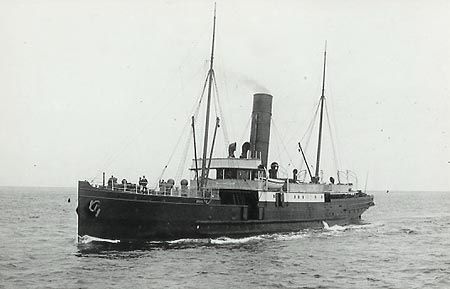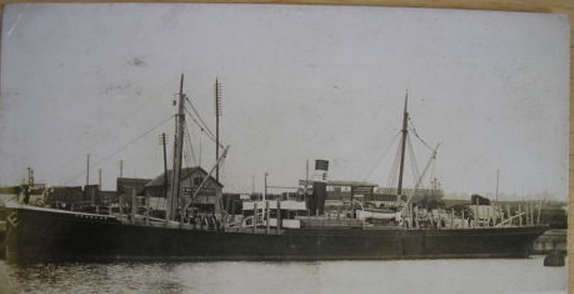SS Douglas, 1889


SS (RMS) Douglas (III) - the third vessel in the Isle of Man
Steam Packet Company (IofMSPC)'s history to bear the name - was a
packet steamer which entered service with the London and
Southwestern Railway Company in 1889 under the name Dora until she
was purchased by the IofMSPC in 1901 for £13,500 (£1,240,948
as of 2014).
Douglas was a steel built, single-screw
vessel constructed by Robert Napier & Co. of Glasgow. She had a
registered tonnage of 774 GRT; length 240 ft 0 in (73.2 m); beam 30
ft 0 in (9.1 m); depth 15 ft 2 in (4.6 m). Douglas had a
certificated accommodation for 506 passengers and a crew of 33.
Napier's were also responsible for her engines and boilers.
The Douglas was a departure in Steam Packet practice. Until 1901 all
its ships had been ordered and built for it, with the exception of
the two eminently suitable vessels Prince of Wales and Queen
Victoria which had been bought in after their owners had
unsuccessfully tilted at the Manx trade.
The Douglas however,
was a straight purchase to fill the gap left when Peveril was sunk
in 1899. The ship had been working the Southampton service to the
Channel Islands and was thus very well suited to the Irish Sea
trade.
In November 1903, she collided with, and sank, the
steamer City of Lisbon in the Mersey. Douglas was used for
winter services to and from the Island, and throughout World War
I, playing a valuable part in maintaining the Island's lifeline.
Douglas was designed to carry a mixture of passengers and
cargo. Her designation as a Royal Mail Ship (RMS) indicated that
she carried mail under contract with the Royal Mail. For the
storage of letters, parcels and specie (bullion, coins and other
valuables) a specified area was allocated for the carriage of
such items. In addition, there was a considerable quantity of
regular cargo, ranging from furniture to foodstuffs and even
motor cars.
On Thursday September 7, 1911, the Douglas
ran aground in the River Mersey as she completing passage from
Douglas to Liverpool.
Having left Douglas at midnight on
Wednesday,[2] by the time the Douglas arrived in the Queen’s
Channel a fog had lowered visibility, resulting in her running
aground near the Crosby Lightship.
The Douglas heeled
over to port slightly, but righted as the tide made. She
subsequently refloated, and arrived into Liverpool at 08:30.
On 16 August 1923, Douglas pulled out of the Brunswick Dock
in the River Mersey at the start of her voyage to Douglas. As
she proceeded down river towards the sea, she attempted to cross
the bows of the Artemisia, a ship of 5,731 tons which was inward
bound to Liverpool with a cargo of sugar from Java.
Artemisia struck the Douglas amidships but the Duty Officer of
the Artemisia prevented any loss of life by keeping his engines
going, and holding his bows into the Douglas's side, so keeping
her afloat until all crew and the 15 passengers were taken off
safely. The Douglas then sank (at 53°23′0″N 3°01′0″W)[3] and her
wreck was destroyed nearly four months later.
The collision was followed by a lengthy and
expensive legal wrangle in which it revealed that the Artmisia
was waiting her turn to enter the dock and was lying a thousand
feet off the entrance with just sufficient seaway to stem the
flood tide. The Douglas left the dock, turned into the tidal
water intending to go around the larger ship. The issue turned
to one of seamanship and the Admiralty Court held that the
Douglas was alone to blame. The case was heard on 5 June 1924.
The Steam Packet appealed against the decision and the
appeal was allowed. This time the Artemisia was held to blame.
Then came the final appeal to the House of Lords. The successful
appeal was dismissed and their Lordships reversed the findings
of the Appeal Court. The responsibility of the collision rested
solely on the Douglas.
See also: Ships named Douglas
Any contributions will be
gratefully accepted
Errors and Omissions
|
|
The Forum
|
|
What's new?
|
|
We are looking for your help to improve the accuracy of The Douglas
Archives.
If you spot errors, or omissions, then
please do let us know
Contributions
Many articles are stubs which would benefit from re-writing.
Can you help?
Copyright
You are not authorized to add this page or any images from this page
to Ancestry.com (or its subsidiaries) or other fee-paying sites
without our express permission and then, if given, only by including
our copyright and a URL link to the web site.
|
|
If you have met a brick wall
with your research, then posting a notice in the Douglas Archives
Forum may be the answer. Or, it may help you find the answer!
You may also be able to help others answer their queries.
Visit the
Douglas Archives Forum.
2 Minute Survey
To provide feedback on the website, please take a couple of
minutes to complete our
survey.
|
|
We try to keep everyone up to date with new entries, via our
What's New section on the
home page.
We also use
the Community
Network to keep researchers abreast of developments in the
Douglas Archives.
Help with costs
Maintaining the three sections of the site has its costs. Any
contribution the defray them is very welcome
Donate
Newsletter
If you would like to receive a very occasional newsletter -
Sign up!
Temporarily withdrawn.
|
|
|
|
|
|
|
|
|


